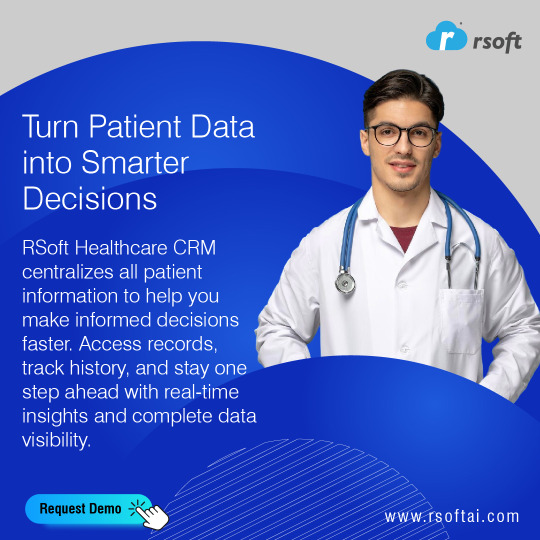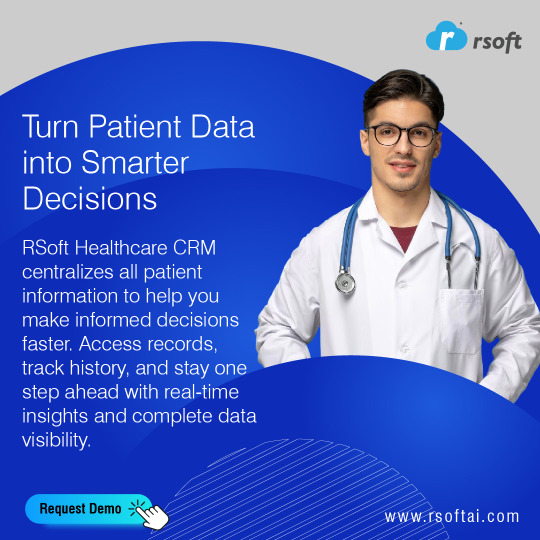#DataDrivenCare
Explore tagged Tumblr posts
Text

Smarter Patient Management with RSoft Healthcare CRM
RSoft Healthcare CRM empowers medical professionals with centralized access to patient records, history tracking, and real-time insights. Make faster, smarter clinical decisions with complete data visibility—streamlining operations and improving patient care.
📞 Call us: 842 803 1234
www.rsoftai.com
#HealthcareCRM #PatientData #HealthTech #MedicalSoftware #RSoft #SmartHealthcare #DataDrivenCare #PatientManagement #HospitalCRM #HealthInnovation
#HealthcareCRM#PatientData#HealthTech#MedicalSoftware#RSoft#SmartHealthcare#DataDrivenCare#PatientManagement#HospitalCRM#HealthInnovation
0 notes
Text

RSoft Healthcare CRM empowers medical professionals with centralized access to patient records, history tracking, and real-time insights. Make faster, smarter clinical decisions with complete data visibility—streamlining operations and improving patient care.
#HealthcareCRM#PatientData#HealthTech#MedicalSoftware#RSoft#SmartHealthcare#DataDrivenCare#PatientManagement#HospitalCRM#HealthInnovation
0 notes
Text
From siloed systems to seamless communication—AI-driven semantic interoperability is reshaping how health data is shared, understood, and acted upon. But can machine intelligence really bridge the decades-old gaps in healthcare data exchange? Dive into the future of HealthTech where AI is more than a tool—it’s the translator of trust, precision, and patient care.
#HealthTech#SemanticInteroperability#AIinHealthcare#DigitalHealth#HealthInnovation#DataDrivenCare#FutureOfHealthcare#HealthIT
0 notes
Text
Why Compare? Because Health Informatics Redefines What HIS Should Be | EMR | Hospital Software | HMS
In today’s rapidly evolving healthcare environment, hospitals and clinics are constantly seeking ways to optimize their operations. The search for the perfect Hospital Information System (HIS) often begins with comparison — features, pricing, scalability, vendor support, integrations, and more. But what if this traditional approach is no longer relevant? What if the very act of comparing legacy systems distracts healthcare professionals from seeing the true potential of what modern technology can offer?

Welcome to the age of Health Informatics, a revolutionary concept that doesn’t just compete with traditional HIS — it transforms it.
Moving Beyond Comparison: The Flaws of Traditional HIS Evaluation
When hospitals evaluate HIS options, they usually look at a checklist:
Does it manage patient records?
Is billing integrated?
Can it schedule appointments?
Is there a lab and pharmacy module?
These are valid questions — but they reflect a system built for the past. Traditional HIS platforms were designed as digital replacements for paper-based workflows. They automate, but they rarely innovate. They replicate, but they don’t predict. And in a world where data is the new currency of healthcare, that’s not enough.
Health Informatics brings a data-driven, patient-centric, and AI-augmented vision to hospital management. It doesn’t just serve administrative needs — it empowers clinical excellence, real-time decision-making, and continuous improvement.
What is Health Informatics?
Health Informatics is the intelligent integration of healthcare, information technology, and data science. It blends EMR (Electronic Medical Records), clinical decision support systems (CDSS), data analytics, and machine learning into one unified ecosystem. Unlike traditional HIS, which often consists of isolated modules, Health Informatics functions as an interconnected brain for your entire hospital.
From the moment a patient walks in, every action — registration, consultation, diagnostics, treatment, follow-up — is tracked, analyzed, and optimized. Not just for that patient, but for every future patient. It helps reduce errors, personalize care, and streamline hospital workflows like never before.
Why Health Informatics is a Whole New Category
Predictive Intelligence: Health Informatics systems use AI to suggest diagnoses, flag critical lab values, and even recommend drug combinations based on patient history. This isn’t automation — it’s augmentation.
Clinical + Operational Harmony: Doctors, nurses, administrators, and patients all interact with a single platform. This creates seamless communication and data sharing across departments.
Built-in Analytics: Traditional HIS systems need third-party tools for business intelligence. With Health Informatics, dashboards, graphs, and reports are part of the core experience.
Remote and Mobile Access: Cloud-based Health Informatics solutions offer apps for doctors, nurses, and even patients. It’s healthcare that moves with you.
Personalized Alerts and Reminders: Never miss a follow-up, critical lab result, or medication update again. The system proactively reminds relevant stakeholders.
Voice-Enabled and Intuitive: With voice-to-text capabilities and intuitive design, Health Informatics simplifies documentation and reduces burnout.
Compliance and Standards-Ready: Be it NABH, HIPAA, or HL7, modern Health Informatics platforms are built with compliance in mind.
Real-Life Impact: A New Era in Healthcare Delivery
Hospitals that have transitioned to Health Informatics platforms report tangible improvements:
30–40% faster patient processing times
Reduction in medication errors by up to 60%
Improved patient satisfaction scores
Greater staff retention due to reduced workload
Enhanced business intelligence and strategic planning
This isn’t just software. It’s a digital revolution in how healthcare is managed, delivered, and evolved.
The Future is Now — Stop Comparing, Start Transforming
Comparing traditional HIS platforms today is like comparing typewriters in the era of smart devices. You’re not choosing between different versions of the same thing — you’re either embracing the future or holding onto the past.
Hospitals that adopt Health Informatics gain a strategic advantage — better care, smarter decisions, and future-ready technology. It’s not about getting more features; it’s about unlocking a completely new paradigm of healthcare excellence.
So, the next time you evaluate hospital software, ask yourself:
Why compare — when you can redefine?
For more Click The Link Below : Best Hospital Management Software
Frequently Asked Questions (FAQ)
1. What is the difference between a traditional HIS and a Health Informatics platform? Traditional HIS systems primarily focus on automating routine tasks such as patient registration, billing, and inventory. Health Informatics platforms, on the other hand, integrate AI, data analytics, EMR, and decision support to offer a holistic and intelligent approach to managing healthcare operations and clinical care.
2. Can Health Informatics be customized for hospitals of different sizes? Absolutely. Health Informatics platforms are scalable and modular. Whether it’s a small clinic, a multi-specialty hospital, or a healthcare network, the system can be tailored to meet specific needs, ensuring cost-effectiveness and maximum utility.
3. Is Health Informatics secure and compliant with global healthcare standards? Yes. Most Health Informatics solutions are built to comply with data protection standards like HIPAA, HL7, and NABH, ensuring secure patient data management and privacy across the board.
#HealthInformatics#HospitalSoftware#EMR#HIS#HMS#DigitalHealth#SmartHospitals#AIinHealthcare#EHR#ClinicalData#HealthcareInnovation#PatientCare#HospitalAutomation#MedicalSoftware#OPDSoftware#IPManagement#Telemedicine#RemotePatientMonitoring#DataDrivenCare#HealthcareAnalytics#HospitalWorkflow#VoiceToTextEMR#NextGenHIS#HospitalManagementSystem#GrapesIDMR#GrapesInnovativeSolutions#JeraldNepoleon#HealthcareRevolution#MedicalAI#PaperlessHospitals
0 notes
Text
Discover how data analytics can revolutionize healthcare by reducing costs! From predictive analytics to optimizing patient care, learn 6 powerful ways data-driven insights can improve efficiency and save money.
0 notes
Text
Cellma: Your Partner in Orthopaedic Excellence
Transforming Orthopaedics – From imaging to surgeries, Cellma streamlines every step!
#Orthopaedics#HealthcareInnovation#PatientCare#PostOpRecovery#PreOpPlanning#PatientPortal#MedicalTechnology#EfficientHealthcare#SurgicalSupport#Rehabilitation#DataDrivenCare#LabResults#ImagingAccess#PatientEngagement#BetterOutcomes
0 notes
Text
https://gencleus.com/blogs/science-behind-the-power-of-plant-based-supplements-everything-you-need-to-know/
#Gencleus#HealthcareSolutions#MedicalInnovation#LifeSciences#TechForGood#AIInHealthcare#DataDrivenCare#MedTech#HealthTech#HealthcareAI
0 notes
Text
AI in Healthcare: Transforming the Future!
From diagnostics to personalized treatment plans, AI is revolutionizing healthcare like never before! By analyzing vast amounts of data, AI helps doctors make faster, more accurate decisions, improving patient outcomes and streamlining processes. Imagine AI-driven tools predicting potential health issues before they arise or creating customized treatment plans tailored just for you. The possibilities are endless!
Discover how AI is shaping the future of medicine and healthcare innovation.
🔍 Read more:
0 notes
Text
Unlocking the Power of Healthcare Analytics: Improving Patient Outcomes
In today’s rapidly evolving healthcare landscape, data is a game-changer. By harnessing the power of healthcare analytics, we’re not just gathering information—we’re transforming it into actionable insights that drive real improvements in patient care.
From predictive analytics that foresee potential health risks to advanced data visualization tools that enhance decision-making, healthcare analytics empowers providers to deliver personalized, proactive care. Imagine identifying patterns that lead to early interventions or using data-driven insights to optimize treatment plans.
The integration of analytics tools into healthcare systems ensures that data isn't just collected, but utilized effectively. It leads to better resource allocation, more accurate diagnoses, and ultimately, improved patient outcomes.
0 notes
Text
Kabhi apne kaam ko chhod, kabhi social media mein kho jao? Aaj se badlo apni duniya! Apne business par dhyan do, digital marketing aur social media ki zimmedariyon ko YCE Network pe saunp do.
8847037612
#FocusOnSuccess#DigitalTransformation#funnyreel#PerfectTiming#DataDrivenCare#digitalsolutions#StrategySecrets#DigitalMarketingAdvantage#socialmediamarketing#MarketingInsights#ourstrategies#FutureForward#DigitalAdvertising#DigitalMarketingTrends#reels#trendingreel#viralvideo#successtips#digitalmarketing#bestdigitalmarketingcompanyintricity#DigitalMarketingMagic#successmindset#bestdigitalmarketingcompanyinchandigarh#bestdigitalmarketingcompanyinmohali#bestdigitalmarketingcompanyinpanchkula#bestdigitalmarketingcompanyinzirakpur#ycenetwork
0 notes
Text
MBA in Business Analytics Colleges in Bangalore
In today's data-driven world, companies don’t just want managers; they want data-smart leaders who can make sense of numbers, trends, and technology. That’s exactly where an MBA in Business Analytics comes in. And if you’re looking for the right place to pursue it, Bangalore is one of the best choices in India!

Why Choose Bangalore?
Known as the Silicon Valley of India, Bangalore is home to top tech companies, startups, and multinational giants. This makes it a hub for analytics, data science, and AI-based roles. Doing your MBA in Business Analytics here not only gives you access to quality education but also connects you with real-world opportunities.
Top MBA in Business Analytics Colleges in Bangalore
Here are some of the best colleges offering MBA/PGDM in Business Analytics:
1. Indian Institute of Management Bangalore (IIMB)
Program: MBA with electives in Business Analytics
Why it stands out: IIMB has top-tier faculty, global recognition, and strong industry ties.
Fees: Approx. ₹24–25 Lakhs (2 years)
Placement: Average package ₹30+ LPA
2. International Institute of Business Studies (IIBS), Bangalore
Program: MBA in Business Analytics
Highlights: Affordable fees, good placements, and strong industry mentorship programs.
Fees: Approx. ₹8–9 Lakhs
Placement: Average package ₹7–8 LPA, with top roles in data analytics, business intelligence & consulting.
3. Symbiosis Institute of Business Management (SIBM), Bangalore
Program: MBA with Analytics specialization
Why it stands out: Known for its academic rigour and placement network.
Fees: Approx. ₹16–18 Lakhs
Placement: Average package ₹11–12 LPA
4. Christ University, Bangalore
Program: MBA with Business Analytics focus
Why it stands out: UGC-approved, good faculty, and structured curriculum.
Fees: Approx. ₹8–9 Lakhs
Placement: Roles in analytics, operations, and IT companies.
5. Alliance University
Program: MBA in Business Analytics
Why it stands out: Industry-integrated learning and global exposure.
Fees: Approx. ₹14–15 Lakhs
Placement: Opportunities with tech firms and consulting giants.
Career Opportunities After an MBA in Business Analytics
After graduation, you can land roles like:
Data Analyst
Business Analyst
Product Analyst
Data Scientist (with added technical skills)
Strategy Analyst
Analytics Consultant
Top recruiters include: TCS, Deloitte, KPMG, Infosys, Accenture, EY, Amazon, Flipkart, and many more.
Final Thoughts
If you’re someone who enjoys working with data, solving problems, and making decisions backed by logic, then an MBA in Business Analytics is perfect for you. And with Bangalore being the tech capital of India, studying here gives you a real edge.
Whether you aim for a top-tier institute like IIM Bangalore or emerging stars like IIBS, ensure the program aligns with your goals and learning style.
#MBAinBusinessAnalytics#BusinessAnalyticsMBA#MBABangalore#TopMBAColleges#IIMBangalore#IIBSBangalore#AnalyticsEducation#DataDrivenCareer#MBA2025#BestCollegesInBangalore
0 notes
Text
Best Data Analytics Course in Coimbatore
Looking to launch a successful career in Data Analytics? Join Upshot Technologies in Coimbatore for the best Data Analytics training, guided by industry-certified trainers and packed with real-time projects and hands-on tools! 🧠💼

#DataAnalyticsCourse#DataAnalyticsCoimbatore#UpshotTechnologies#LearnDataAnalytics#AnalyticsTraining#CertifiedTrainers#CareerInData#BestTrainingInstitute#JobOrientedCourse#DataDrivenCareer#JoinNow#UpskillWithUpshot
0 notes
Text

PGCM in Business Analytics
Earn your Post Graduate Certification in Business Analytics in just 12 months! Why wait to level up your career?
Enroll now with MITSDE and get started!
#BusinessAnalytics#AnalyticsCertification#DataDrivenCareer#UpskillNow#PGDMAnalytics#MITSDE#12MonthsPGDM
0 notes
Text
Exploring the Scope of MBA in Business Analytics: Career Paths, Skills & Industry Demand
An MBA in Business Analytics opens doors to dynamic careers in data-driven roles like Business Analyst, Data Scientist, and Strategy Manager. It equips professionals with skills in data interpretation, statistical analysis, and decision-making. With rising demand across industries such as finance, healthcare, and e-commerce, this specialization offers strong growth and competitive Read More...

0 notes
Text
Hybrid Technology – Works Anywhere, Access Everywhere!
In the modern healthcare landscape, technology continues to reshape how care is delivered and experienced. One of the most significant advancements is the introduction of hybrid healthcare platforms — intelligent systems that integrate various medical devices and digital interfaces to provide seamless, real-time care across multiple touchpoints. With patient outcomes at the forefront, hybrid technology is proving to be a game-changer for healthcare providers and patients alike.

What is a Hybrid Healthcare Platform?
A hybrid healthcare platform combines software and hardware components to deliver a unified healthcare experience. By connecting different monitoring systems like intensive care (IC) monitors, ventilator monitors, and electronic data handling systems, the platform creates a cohesive environment where all patient data is centralized and accessible in real time.
This interconnectivity allows healthcare professionals to monitor, analyze, and act on patient data from virtually any location, making it possible to respond faster and more effectively to a patient's needs.
youtube
Key Features of Hybrid Technology in Healthcare
Device Integration
The hybrid model integrates devices from various manufacturers into one coherent platform.
Real-time data is collected from ICU equipment, ventilators, and other monitoring tools.
Data is transmitted securely, ensuring HIPAA compliance and patient privacy.
Mobile Accessibility
Doctors and nurses can access data via a secure mobile application.
Critical results, alerts, and trends are available at the fingertips of authorized personnel.
This promotes faster diagnostics and interventions, regardless of location.
Electronic Data Handling
The system utilizes advanced electronic data handling equipment (EDHE) to compile and manage vast volumes of patient information.
Automation ensures that data is accurate, up-to-date, and immediately accessible.
Real-Time Updates
Live updates help healthcare providers respond promptly to changes in patient conditions.
Reduces response time during emergencies, potentially saving lives.
Cloud and On-Premise Hybrid Storage
Combining cloud-based storage with on-premise infrastructure ensures data security, scalability, and accessibility.
Facilitates remote work and telemedicine services while maintaining strong control over local data.
Why Hybrid Platforms Matter
In a post-pandemic world, telemedicine and digital healthcare are no longer optional — they’re essential. Hybrid technology plays a vital role in enabling remote care while still leveraging the power of traditional, in-hospital systems. With the ability to collect and share data across departments and devices, healthcare providers benefit from a more comprehensive view of the patient's condition.
Imagine a scenario where a patient in an intensive care unit is being monitored with multiple devices. With a hybrid platform, all readings — heart rate, oxygen levels, blood pressure, and ventilator settings — are integrated into a single dashboard. A specialist, even off-site, can immediately access this dashboard through their smartphone or tablet, review trends, and provide consultation. This enhances communication, collaboration, and patient care dramatically.
Benefits for Healthcare Providers
Faster Decision-Making Access to real-time data reduces delays in diagnosis and treatment.
Improved Communication Doctors, nurses, and specialists can collaborate more efficiently.
Reduced Administrative Burden Automated data capture and reporting mean less manual paperwork and more time for patient care.
Remote Monitoring Enables clinicians to monitor patients without being physically present, a crucial benefit in resource-limited or quarantine situations.
Benefits for Patients
Enhanced Monitoring Continuous data collection ensures that no detail is missed, improving diagnosis accuracy.
Faster Response Times Medical staff can intervene more quickly, reducing complications and improving outcomes.
Accessible Health Records Patients can view their own health information through companion apps, promoting transparency and engagement.
Applications of Hybrid Healthcare Platforms
Hybrid technology isn't limited to ICU or emergency settings. Its applications include:
Primary Care Clinics – For quick diagnostics and patient tracking.
Home Healthcare – Monitor chronic conditions like diabetes, COPD, or hypertension.
Telehealth Services – Provide virtual consultations and follow-ups.
Rural & Remote Clinics – Deliver high-quality care even in underserved areas.
Security and Compliance
Data security is a major concern in digital healthcare. Hybrid systems are designed with robust encryption protocols, user access controls, and compliance standards to protect sensitive information. With built-in logs and audit trails, they help meet regulatory requirements like HIPAA, GDPR, and other national healthcare data laws.
The Future of Hybrid Healthcare
The future of healthcare lies in interconnected, intelligent systems. With advancements in AI, machine learning, and Internet of Medical Things (IoMT), hybrid platforms are set to become even smarter. Predictive analytics could soon anticipate health issues before they occur, and voice-activated systems could allow for hands-free operation in sterile environments.
As technology continues to evolve, hybrid platforms will remain at the heart of smart hospitals, bridging gaps between care providers and enabling a higher standard of personalized, efficient healthcare.
Conclusion
The hybrid healthcare platform is a revolutionary approach that ensures access everywhere and functionality anywhere. It breaks down silos between departments, improves communication, and delivers real-time insights that empower healthcare professionals to act swiftly and confidently.
As we move forward in this digital age, hybrid technology will not only optimize workflows but also redefine what it means to deliver patient-cantered care. It’s not just about innovation—it’s about creating a smarter, more responsive, and compassionate healthcare system.
For more Click The Link below : Best Hospital Management Software
#HybridHealthcare#DigitalHealth#HealthTech#MedTech#Telemedicine#RemoteMonitoring#PatientCare#SmartHospitals#HealthcareInnovation#IoMT#MobileHealth#HealthcareIT#HospitalTechnology#RealTimeData#MedicalDevices#HealthMonitoring#EHealth#HealthcareSolutions#CloudHealthcare#HealthInformatics#DataDrivenCare#MobileHealthApp#VirtualCare#ICUMonitoring#HealthcareIntegration#SmartCare#Youtube
0 notes